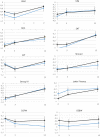The APOE ε4 allele in relation to pre- and postsurgical cognitive functioning of patients with primary brain tumors
- PMID: 33342004
- PMCID: PMC8247965
- DOI: 10.1111/ene.14693
The APOE ε4 allele in relation to pre- and postsurgical cognitive functioning of patients with primary brain tumors
Abstract
Background: Recent studies suggest a relationship between the APOE ε4 allele and cognitive outcome in patients treated for malignant brain tumors. Still, longitudinal investigations that include a pretreatment cognitive assessment are lacking and APOE's effects in patients with benign tumors are understudied. This study investigated presurgical cognitive performance and postsurgical change in ε4-carrying and non-carrying patients with glioma and meningioma.
Methods: Neuropsychological test scores (CNS Vital Signs battery [seven measures], Digit Span Forward/Backward, Letter Fluency test) were obtained as part of a prospective study in which patients with meningioma and glioma underwent cognitive assessment 1 day before (T0, n = 505) and 3 (T3, n = 418) and 12 months after (T12, n = 167) surgery. APOE isoforms were identified retrospectively. ε4 carriers and non-carriers were compared with regard to pretreatment cognitive performance on the group and individual level. Changes in performances over time were compared with longitudinal mixed model analysis in the total sample and the subgroup receiving adjuvant treatment.
Results: Carriers and non-carriers did not differ with regard to pretreatment performance. No significant main effect of ε4 carrier status or interaction between time (T0-T12) and carrier status was found on any of the tests in the whole sample nor in the sample receiving adjuvant treatment.
Conclusions: This study found no evidence of increased vulnerability for pretreatment cognitive dysfunction or cognitive decline within 1 year after surgery in APOE ε4-carrying meningioma and glioma patients. Investigations that include larger samples at longer-term follow-up are recommended to investigate potential late treatment effects.
Keywords: APOE ε4; brain tumor; cognitive functioning; glioma; meningioma.
© 2020 The Authors. European Journal of Neurology published by John Wiley & Sons Ltd on behalf of European Academy of Neurology.
Conflict of interest statement
The authors report no financial, personal or professional conflict of interest for this study and the findings specified in this article.
Figures



Similar articles
-
Association Between Apolipoprotein E ε2 vs ε4, Age, and β-Amyloid in Adults Without Cognitive Impairment.JAMA Neurol. 2021 Feb 1;78(2):229-235. doi: 10.1001/jamaneurol.2020.3780. JAMA Neurol. 2021. PMID: 33044487 Free PMC article. Clinical Trial.
-
Association between white matter hyperintensity severity and cognitive impairment according to the presence of the apolipoprotein E (APOE) ε4 allele in the elderly: retrospective analysis of data from the CREDOS study.J Clin Psychiatry. 2012 Dec;73(12):1555-62. doi: 10.4088/JCP.12m07702. Epub 2012 Oct 30. J Clin Psychiatry. 2012. PMID: 23146133
-
Vitamin B-12, apolipoprotein E genotype, and cognitive performance in community-living older adults: evidence of a gene-micronutrient interaction.Am J Clin Nutr. 2009 Apr;89(4):1263-8. doi: 10.3945/ajcn.2008.26969. Epub 2009 Feb 25. Am J Clin Nutr. 2009. PMID: 19244370
-
Apolipoprotein E ε4 and cognitive function after surgery in middle-aged and elderly Danish twins.Eur J Anaesthesiol. 2020 Nov;37(11):984-991. doi: 10.1097/EJA.0000000000001250. Eur J Anaesthesiol. 2020. PMID: 32618758 Free PMC article.
-
The Elusive Nature of APOE ε4 in Mid-adulthood: Understanding the Cognitive Profile.J Int Neuropsychol Soc. 2017 Mar;23(3):239-253. doi: 10.1017/S1355617716000990. Epub 2017 Jan 6. J Int Neuropsychol Soc. 2017. PMID: 28059047 Review.
Cited by
-
Prognostic significance and immune characteristics of APOE in gastric cancer.Aging (Albany NY). 2023 Dec 4;15(23):13840-13853. doi: 10.18632/aging.205265. Epub 2023 Dec 4. Aging (Albany NY). 2023. PMID: 38054821 Free PMC article.
-
Influences on cognitive outcomes in adult patients with gliomas: A systematic review.Front Oncol. 2022 Aug 5;12:943600. doi: 10.3389/fonc.2022.943600. eCollection 2022. Front Oncol. 2022. PMID: 36033458 Free PMC article.
-
Predicting Cognitive Functioning for Patients with a High-Grade Glioma: Evaluating Different Representations of Tumor Location in a Common Space.Neuroinformatics. 2024 Jul;22(3):329-352. doi: 10.1007/s12021-024-09671-9. Epub 2024 Jun 20. Neuroinformatics. 2024. PMID: 38900230 Free PMC article.
-
Perioperative Neurocognitive Function in Glioma Surgery.Curr Oncol Rep. 2024 May;26(5):466-476. doi: 10.1007/s11912-024-01522-9. Epub 2024 Apr 4. Curr Oncol Rep. 2024. PMID: 38573439 Review.
-
Cognitive functioning in untreated glioma patients: The limited predictive value of clinical variables.Neuro Oncol. 2024 Apr 5;26(4):670-683. doi: 10.1093/neuonc/noad221. Neuro Oncol. 2024. PMID: 38039386 Free PMC article.
References
-
- Ali FS, Hussain MR, Gutiérrez C, et al. Cognitive disability in adult patients with brain tumors. Cancer Treat Rev. 2018;65:33‐40. - PubMed
-
- Taphoorn MJ, Klein M. Cognitive deficits in adult patients with brain tumours. Lancet Neurol. 2004;3(3):159‐168. - PubMed
-
- Correa D, DeAngelis L, Shi W, Thaler H, Lin M, Abrey L. Cognitive functions in low‐grade gliomas: disease and treatment effects. J Neurooncol. 2007;81:175‐184. - PubMed
Publication types
MeSH terms
Substances
LinkOut - more resources
Full Text Sources
Other Literature Sources
Medical
Miscellaneous

